

The Affordable Care Act is a Historic Opportunity to Advance Health Care Justice for African-Americans. As we celebrate Black History Month and remember the contributions of African-Americans throughout our nation's history, it's important to also focus on the work that still lies ahead to achieve racial justice.

Decades ago, Rev. Dr. Martin Luther King said, "Of all the forms of inequality, injustice in health care is the most shocking and inhumane. " Despite the progress we have made, African-Americans and other people of color still struggle daily with unjust, and sometimes deadly, health care inequality. The Affordable Care Act presents a historic opportunity to level this hazardous playing field. African-Americans face many health disparities compared to white non-Hispanics These disparities transcend age and gender. African-Americans are 30 percent more likely than whites to die from heart disease and 2.2 times as likely to die of asthma. African-American-Key-Points. Slavery in America - Black History. The South would reach the breaking point the following year, when Republican candidate Abraham Lincoln was elected as president.

Within three months, seven southern states had seceded to form the Confederate States of America; four more would follow after the Civil War (1861-65) began. Though Lincoln’s antislavery views were well established, the central Union war aim at first was not to abolish slavery, but to preserve the United States as a nation. Abolition became a war aim only later, due to military necessity, growing anti-slavery sentiment in the North and the self-emancipation of many African Americans who fled enslavement as Union troops swept through the South.
Five days after the bloody Union victory at Antietam in September 1862, Lincoln issued a preliminary emancipation proclamation, and on January 1, 1863, he made it official that “slaves within any State, or designated part of a State…in rebellion,…shall be then, thenceforward, and forever free.” Act Prohibiting the Return of Slaves. The Act Prohibiting the Return of Slaves was a law passed by the United States Congress during the American Civil War forbidding the military to return escaped slaves to their owners.
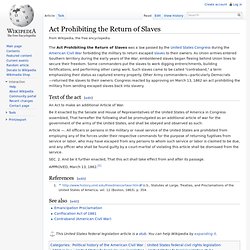
As Union armies entered Southern territory during the early years of the War, emboldened slaves began fleeing behind Union lines to secure their freedom. Some commanders put the slaves to work digging entrenchments, building fortifications, and performing other camp work. Such slaves came to be called "contraband," a term emphasizing their status as captured enemy property. Other Army commanders—particularly Democrats—returned the slaves to their owners.
Congress reacted by approving on March 13, 1862 an act prohibiting the military from sending escaped slaves back into slavery. Act Prohibiting Importation of Slaves. The Act Prohibiting Importation of Slaves of 1807 (2 Stat. 426, enacted March 2, 1807) is a United States federal law that stated that no new slaves were permitted to be imported into the United States.
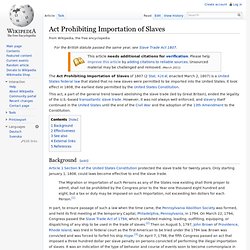
It took effect in 1808, the earliest date permitted by the United States Constitution. Confiscation Act of 1861. The Confiscation Act of 1861 was an act of Congress during the early months of the American Civil War permitting court proceedings for confiscation of any of property being used to support the Confederate independence effort, including slaves.
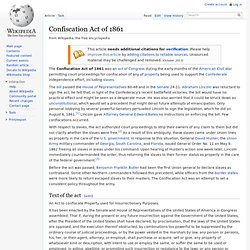
With respect to slaves, the act authorized court proceedings to strip their owners of any claim to them but did not clarify whether the slaves were free.[2] As a result of this ambiguity, these slaves came under Union lines as property in the care of the U.S. government. In response to this situation, General David Hunter, the Union Army military commander of Georgia, South Carolina, and Florida, issued General Order No. 11 on May 9, 1862 freeing all slaves in areas under his command. Kansas–Nebraska Act. This 1856 map shows slave states (gray), free states (pink), U.S. territories (green), and Kansas in center (white).
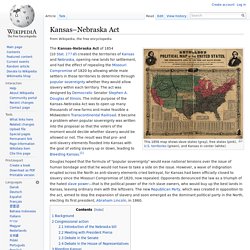
The Kansas–Nebraska Act of 1854 (10 Stat. 277) created the territories of Kansas and Nebraska, opening new lands for settlement, and had the effect of repealing the Missouri Compromise of 1820 by allowing white male settlers in those territories to determine through popular sovereignty whether they would allow slavery within each territory. The act was designed by Democratic Senator Stephen A. Douglas of Illinois. The initial purpose of the Kansas–Nebraska Act was to open up many thousands of new farms and make feasible a Midwestern Transcontinental Railroad.
It became a problem when popular sovereignty was written into the proposal so that the voters of the moment would decide whether slavery would be allowed or not. Timeline of the African-American Civil Rights Movement. List of landmark African-American legislation. Congressional Legislation[edit] Bills not passed[edit] Bills signed into law[edit] U.S.
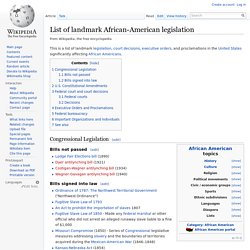
Constitutional Amendments[edit] Federal court and court decisions[edit] Federal courts[edit] Enforcement Acts. The Enforcement Acts were three bills passed by the United States Congress between 1870 and 1871.
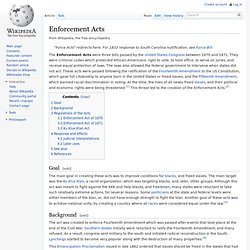
They were criminal codes which protected African-Americans’ right to vote, to hold office, to serve on juries, and receive equal protection of laws. Civil Rights Act of 1875. The Civil Rights Act of 1875 (18 Stat. 335-337),[2] sometimes called Enforcement Act or Force Act, was a United States federal law enacted during the Reconstruction Era that guaranteed African Americans equal treatment in public accommodations, public transportation, and prohibited exclusion from jury service.
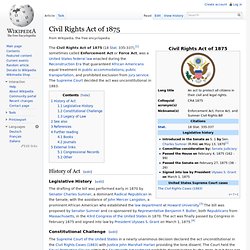
The Supreme Court decided the act was unconstitutional in 1883. History of Act[edit] Legislative History[edit] Constitutional Challenge[edit] The Supreme Court of the United States in a nearly unanimous decision declared the act unconstitutional in the Civil Rights Cases (1883) with Justice John Marshall Harlan providing the lone dissent. Civil Rights Act of 1866. The Civil Rights Act of 1866, 14 Stat. 27-30, enacted April 9, 1866, is a United States federal law that was mainly intended to protect the civil rights of African-Americans, in the wake of the American Civil War.
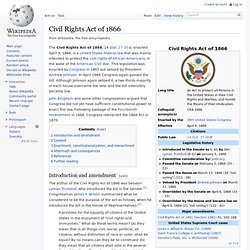
This legislation was enacted by Congress in 1865 but vetoed by President Andrew Johnson. In April 1866 Congress again passed the bill. Although Johnson again vetoed it, a two-thirds majority in each house overcame the veto and the bill ostensibly became law. John Bingham and some other congressmen argued that Congress did not yet have sufficient constitutional power to enact this law.